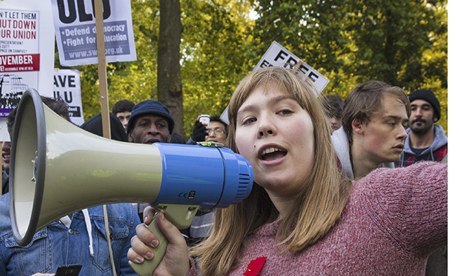Police are cracking down on students – but what threat to law and order is an over-articulate history graduate?
For most of my life student politics has been little more than a joke. Suddenly it's become both serious and admirable

A protester against the proposed closure of the ULU student union last week. Photograph: Paul Davey/Demotix/Corbis
Why are some of the most powerful people in Britain so terrified of a bunch of students? If that sounds a ridiculous question, consider a few recent news stories. As reported in this paper last week, Cambridge police are looking for spies to inform on undergraduate protests against spending cuts and other "student-union type stuff". Meanwhile, in London last Thursday, a student union leader, Michael Chessum, was arrested after a small and routine demo. Officers hauled him off to Holborn police station for not informing them of the precise route of the protest – even though it was on campus.
The 24-year-old has since been freed – on the strict condition that he doesn't "engage in protest on any University Campus and not within half a mile boundary of any university". Even with a copy of the bail grant in front of me, I cannot make out whether that applies to any London college, any British university – or just any institute of higher education anywhere in the world. As full-time head of the University of London's student union, Chessum's job is partly to protest: the police are blocking him from doing his work. But I suppose there's no telling just what threat to law and order might be posed by an over-articulate history graduate.
While we're trawling for the ridiculous, let us remember another incident this summer at the University of London, when a 25-year-old woman was arrested for the crime of chalking a slogan on a wall. That's right: dragged off by the police for writing in water-soluble chalk. Presumably, there would have been no bother had she used PowerPoint.
It all sounds farcical – it is farcical – until you delve into the details. Take the London demo that landed Chessum in such bother: university staff were filming their own students from a balcony of Senate House (the building that inspired the Ministry of Truth in Orwell's Nineteen Eighty-Four, appropriately enough). Such surveillance is a recent tradition, the nice man in the University press office explains to me – and if the police wanted the footage that would be no problem.
That link with the police is becoming increasingly important across more and more of our universities. London students allege that officers and university security guards co-ordinate their attempts to rein in demonstrations while staff comment on the increased police presence around campus. At Sussex, student protests against outsourcing services were broken up this April, when the university called in the police – who duly turned up with riot vans and dogs. A similar thing happened at Royal Holloway university, Surrey in 2011: a small number of students occupied one measly corridor to demonstrate against course closures and redundancies; the management barely bothered to negotiate, but cited "health and safety" and called in the police to clear away the young people paying their salaries.
For most of my life, student politics has been little more than a joke – the stuff of Neil off the Young Ones, or apprentice Blairites. But in the past few years it has suddenly become both serious and admirable, most notably with the protests of 2010 against £9,000 tuition fees and the university occupations that followed. And at just that point, both the police and university management have become very jumpy.
For the police, this is part of the age-old work of clamping down on possible sources of civil disobedience. But the motivation for the universities is much more complicated. Their historic role has been to foster intellectual inquiry and host debate. Yet in the brave new market of higher education, when universities are competing with each other to be both conveyor belts to the jobs market and vehicles for private investment, such dissent is not only awkward – it's dangerously uncommercial. As Andrew McGettigan, author of The Great University Gamble, puts it: "Anything too disruptive gets in the way of the business plan."
Last month it appeared that Edinburgh University had forced its student union to sign a gagging clause (now withdrawn). No union officer is allowed to make any public criticism of the university without giving at least 48 hours' notice. University managers reportedly made that a deal-breaker if the student union was to get any funds.
The managers of the University of London want to shut down the student union at the end of this academic year. The plan – which is why Chessum and co were marching last week – is to keep the swimming pool and the various sports clubs, but to quash all university-wide student representation. After all, the students are only the people paying the salary of the university vice-chancellor, Adrian Smith – why should they get a say? The plan, it may not surprise you to learn, was drawn up by a panel that didn't number a single student. What with sky-high fees and rocketing rents in the capital, you might think that the need for a pan-London student body had never been higher. But then, you're not a university manager on a six-figure salary.
Where universities were historically places of free expression, now they are having to sacrifice that role for the sake of the free market. For students, that comes in the form of a crackdown on dissent. Yet the twentysomethings at university now will end up running our politics, our businesses and our media. You might want these future leaders to be questioning and concerned about society. Or you might wonder whether sending in the police to arrest a woman chalking a wall is proportionate. Either way, you should be troubled.
